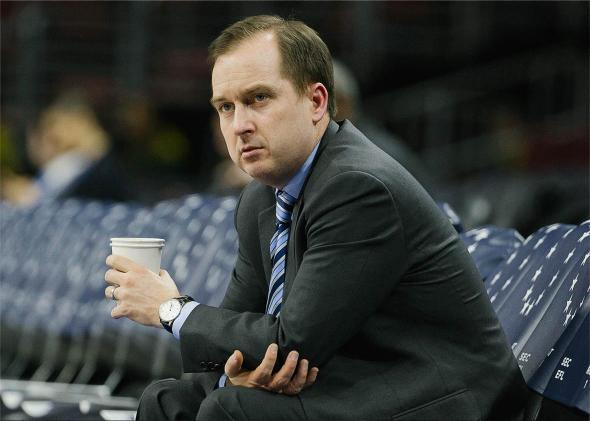General manager Sam Hinkie of the NBA’s Philadelphia 76ers resigned on Wednesday. This itself was not a shocking event, all things considered: The 76ers are a historically bad basketball team, and there have been signs that Hinkie’s bosses (the team’s owners) were getting impatient with him. More notable is how Hinkie resigned: Via a 13-page letter that begins by citing surgeon and New Yorker writer Atul Gawande and continues on to quote several well-known investors, physicist Max Planck, and Abraham Lincoln while digressing for anecdotes about subjects such as the BlackBerry smartphone and the flightless New Zealand moa bird.
How did we get here? Well, Hinkie is part of a generation of analytically oriented sports-management types with backgrounds in the business world. Other notable figures of this stripe include Los Angeles Dodgers president Andrew Friedman, who once worked for Bear Stearns, and consultant-turned-Houston Rockets GM Daryl Morey. (Moneyball hero Billy Beane hires people with MBAs, but he himself is a former major-league ballplayer.) Hinkie’s specific strategic plan for the 76ers, put in layperson’s terms, was to severely sacrifice short-term competitiveness while pursuing high-potential younger players. The extremes to which Hinkie pushed this strategy were controversial even among forward-thinking fans—see Jack Hamilton’s Slate piece on the subject of the Sixers’ epic badness here—and while his moves may well eventually pay dividends for the team, in recent months Hinkie’s bosses have gotten antsy and started to bring other high-level basketball management figures with more conventional approaches into the organization.
Which is why he resigned. The letter is his attempt to convince the team’s owners—many of whom themselves have backgrounds in fields like private equity—of the soundness of his plan on his way out the door; a plea, as it were, not to completely blow up the foundation he laid. Hinkie’s message is explicitly modeled after the big-picture-philosophy letters to investors that figures like Warren Buffett often send. And that’s where the citations of Atul Gawande, Max Planck, etc., come in—via the kind of strategic/inspirational Gladwellian aphorisms and anecdotes that are the metaphorical currency of the realm of people who make their living moving around literal currency. To wit, in a section about how quickly new developments can undermine previously successful ways of thinking:

Screenshot/ESPN
(The moa is, in fact, extinct. RIP moa bird, you continue to serve us well as a metaphor for 1970s General Motors.)
And this, about his decision-making process:

Screenshot/ESPN
You can read the whole thing on ESPN’s site here—it leaked, of course—and, honestly, it’s pretty interesting and coherent in an airport-book sort of way. But the problem with the Sixers wasn’t so much Hinkie’s philosophy as his execution thereof. While Hinkie sees himself as a maverick who bucked the conventional wisdom of NBA front offices, in reality he pursued commonplace ends—a roster rebuilt via the draft with young, inexpensive talent—with shock-doctrine means that didn’t work out in practice. He acquired talented young players who weren’t healthy. He acquired healthy young players who weren’t talented. He was cheap, and his teams were unwatchably bad. In his nearly three full seasons as general manager, his Sixers won 47 games and lost 195. Fans all along were told to “trust the process.” Eventually—inevitably?—his philosophy of sacrificing short-term profits (i.e. actual wins) drained his bosses’ good will, to the point that even speaking their language via references to Charlie Munger couldn’t convince them Hinkie was the right man for the job.
Here’s the Lincoln reference, by the way:

Screenshot/ESPN
Oh, and one other thing: Two of the 76ers’ “equity partners” (co-owners), to whom Hinkie’s letter was addressed, were Will and Jada Pinkett Smith. What a world.
